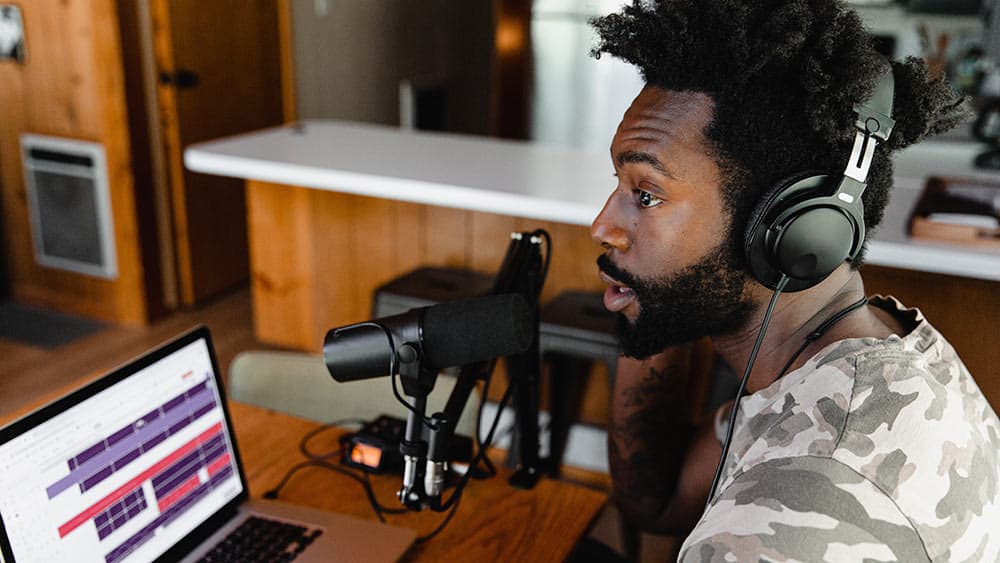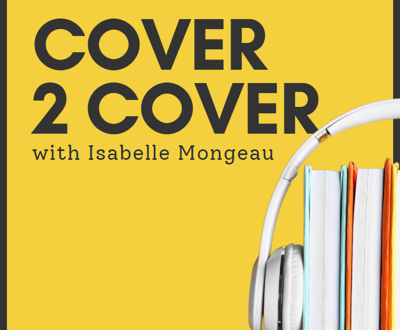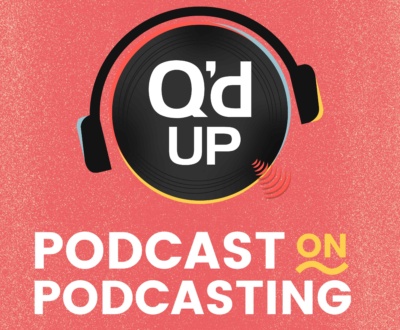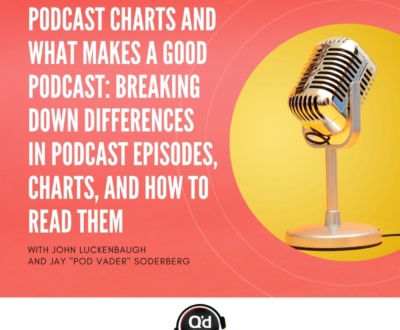
If you look around the podcast industry right now, we won’t blame you for thinking every podcast needs to be an interview. Between celebrities and entrepreneurs, there seem to be a never-ending number of interview podcasts hitting the market. But for those that don’t want to interview people or just want to share their own passions and expertise with an audience, solo podcasts are a great option.
So, can you do a podcast alone anymore? Absolutely! Solo podcasts are still very much thriving, as long as you do them justice. However, that’s not always easy to do and plenty of podfaded solo podcasts tell the story of ambition without the follow-through needed to find success. We here at Q’d Up Audio believe in the power of solo podcasts. We even have several of our own, including the Q’d Up Podcast on Podcasting.
So, to help those budding podcasters launch their own solo podcasts, we’ve compiled some of the things we’ve learned so you can make yours the best it can be. We’ll cover what a solo podcast even is, what goes into them, why solo podcasts can be amazing, and several top tips to ensure your solo podcast launches strong.
What Is A Solo Podcast?
Before we jump into how to make your solo podcast entertaining, let’s first talk about what the term “solo podcast” actually means.
A solo podcast can be just about anything. The only qualifier is that there’s just one voice on the microphone. It can be a narrative story designed to entertain. It can be an advice podcast with the host sharing their expertise and insights on a subject. Just look at my writing podcast, Cover 2 Cover for a great look at how a solo podcast can be entertaining and informative with just one person.
Now, it’s important to note that a solo podcast doesn’t necessarily need to only have one person working on it. There can be teams of people handling the pre-production, production, and marketing of the podcast. In fact, we’re strong proponents of solo podcasters getting some help so they don’t have to carry an entire show by themselves, even if that’s just handling the production tasks you can’t or won’t do personally.
Why Should You Make A Solo Podcast?
According to Podcast Industry Insights, there are currently 2.4 million podcasts on Apple Podcasts alone. Combine that with Spotify, Stitcher and other platforms, and we’re looking at a gigantic number of podcasts currently available. Sometimes, it can feel like all 2.4 million of them are interview podcasts. From celebrities to Joe Blow down the street, everyone seems to have someone to interview.
It makes some sense. Interview podcasts are a great way to grow your brand, network, and audience. Because an interview podcast is dependent on engaging guests to help create engaging content, they can be a lot easier to do than a solo podcast. But because there are so many interview podcasts, especially with celebrity hosts, it’s far harder to stand out above the crowd. And because each episode is so dependent on how great the guest is, there are plenty of interview podcasts that go from excellent to dud on a weekly basis; if they even get a great episode out in the first place.
Yes, a great solo podcast is far tougher to develop than many of the other styles of podcasts. However, those that do stand out, really stand out. Because they rely on the host and the content itself rather than a guest, solo podcasts can be more consistently entertaining and engaging. And don’t forget . . . consistency and engagement are two very big parts of the recipe that is a successful podcast.
If you’re looking to do something a little different, trust your ability to consistently create great content, and don’t want to deal with guest schedules, a solo podcast could be the perfect answer for you.
Tips And Tricks For The Best Solo Podcast
If a solo podcast can help you stand out above the crowd, it’s time to figure out how to make your podcast great. After working on countless podcasts, seasons, and episodes; we’ve learned quite a bit about what makes a solo podcast successful. While we’ve found that each podcast will require different things to be successful, there are a few things that are universal.
So, how do you create a great solo podcast? Let’s take a closer look at the six tips that will make sure your solo podcast is entertaining and engaging.
1) Setting Goals
What does a successful podcast look like to you? You won’t actually know the answer to that question unless you have some goals set up in the first place. It could be that your goal is to get as many listeners as possible but there are a ton of potential goals for every style of podcast. You could be looking for an increase in your brand awareness, you could want to sell merchandise, or start a book tour off the success of your podcast.
No matter what your goal is, you need to think long and hard about what you want to achieve with your solo podcast before you ever put pen to paper or lips near a mic.
2) Hook ’em!
A solo podcast is not an interview, meaning you can’t rely on a guest’s following, brand, or promotion to garner interest for your episode. Therefore, you must do it yourself—and right away. Don’t believe us? According to a study from Microsoft, the average attention span is only 8 seconds, which is shorter than a goldfish.
Whether you open with an alarming stat, a story, or a joke; you only have a very short window to pique your audience’s curiosity. Be sure to make it count! The opening to your podcast has to catch your audience’s attention and tease them into the episode itself. So, you probably can’t afford to have a minute-long intro before you ever say a word, especially if you’re not immediately engaging when you do start speaking.
If you’re looking for ways to improve the hook of your solo podcast, check out our post on 18 ways to hook your audience immediately.
3) Write It Out
Whether you have a fully scripted episode or merely some bullet points, you must write something down before you hop on the mic. As it’s a solo podcast, you won’t have another person to bounce off of. So, make sure you know what you want to say before you say it. Otherwise, you will meander, stumble over words, and struggle to put something together fluidly. That means more time editing and re-recording segments, which likely ends with you getting more frustrated until you podfade away.
By writing down your thoughts, you organize them. And no matter how much someone may sound candid on your favorite shows, they’re usually not. In fact, it wouldn’t be your favorite show if it were truly and completely unplanned. So, when it comes to solo podcasts, it’s imperative to make sure you—“the solo”—is prepared.
4) Do Your Research
Just as you would research your guest for an interview, you should also research the topic you’re discussing in a solo podcast. If you don’t take the time to research, you won’t be able to make articulate and accurate points. More importantly, you will sound like you don’t know what you’re talking about—and your audience will pick up on it.
We even urge our most experienced hosts to review their topic. There may be new stats, reports, or stories that can alter or freshen your view. Your opinion is the only opinion the audience is hearing on a solo podcast, so make sure it’s an informed one.
5) Keep It Short
A great way to keep your solo podcast engaging—and keep people coming back—is to keep it short. Having a tight script forces you to cut out the unnecessary. By limiting yourself to just 15-20 minutes per episode, you’re forced to eliminate areas where you become redundant, too detailed for a podcast, or simply go off topic. That means a tighter episode packed with only the top points and an audience that is happier for it.
As much as they love you, your audience doesn’t need or want to hear two hours of your meandering thoughts. And if they’re demanding hours of your organized thoughts, then consider creating an audiobook instead!
6) Pay Attention To Pace
While your script determines the length of your show, your pacing determines how long it feels. Pacing can be difficult to formalize—but when you get it wrong, it’s glaringly obvious. Although we just said keep it short—you really just want your solo podcast to feel short. A 10-minute episode can easily drag if the pace is slow. On the other hand, a 45-minute can feel like only a few minutes if done correctly.
So, what’s the trick?
While pacing feels like an abstract technique, it’s done in the writing mechanics. Are there cliff hangers at the end of every section? At the end of every paragraph? Is there tension in what you’re saying? Are you ever repeating yourself? After a dramatic moment, do you have a quiet moment of reflection?
Go through every sentence of your script (or prep work) and ask yourself: is this sentence necessary? If not, get rid of it. Your solo podcast will thank you, and so will your audience.
A great way to determine pacing is to read your script out loud. An even better (but braver!) way is to read your work out loud to someone else and notice when their eyes wander, their body language becomes fidgety, or if they seem to tune out.
We also like to say work your way up! Try writing an engaging and well-paced 15-minute script. Once you’ve mastered that, you can work up to 20 minutes, maybe even 25. However, we tend to suggest not going longer than 30 minutes for a solo podcast.
7) Wrap It Up!
As we noted above, the average attention span is pretty short. Even if your podcast is 10 minutes long, that’s far greater than the average attention span, which means your listeners likely forgot something. So remind them!
If you’re a podcast focused on giving advice or sharing your insights, finish up your episode with a quick wrap-up. Touch on the main points you discussed in your podcast, giving a quick 30-second highlight of the episode.
That helps listeners remember everything they’ve heard, hear things they might have missed, and leaves them feeling like they took something away from the episode. That makes them more likely to return for your next episode, subscribe to your solo podcast, and share the word with others.
8) Make The Best Solo Podcast By Being You!
Lastly, be you!
When putting together a solo podcast, it can be easy to get caught up in what you think others want. It’s tempting to replicate successful podcasters you admire. However, those podcasters already exist, and your show will feel just like that—a replication. Like with research, your audience will be able to tell if you are doing something inauthentic to you.
When you share what you love, it’s infectious. Your enthusiasm will make others love it too. That passion will continue to feed you and them, and endurance is a skill paramount to podcasting.
The reality is that audiences will discover your podcast for its subject, but they will stay because of you. They want to hear what you have to say, and like the way you say it. So do yourself–and them—a favor and just embrace your style. In the long run, you’ll be happier and more invested in the project. And you’ll make your show the best solo podcast it can be.
Request a free quote
We offer high-quality production, distribution, and marketing for podcasts and audiobooks. Contact us today for a free, no obligation quote









